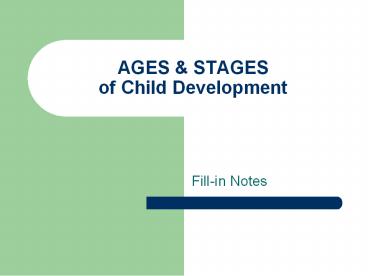AGES PowerPoint PPT Presentation
1 / 22
Title: AGES
1
AGES STAGES of Child Development
- Fill-in Notes
2
Stage Names and Age Ranges
- Newborn
- Infancy
- Toddlerhood
- Preschool age
- School age
3
Types of Growth Development
- Physical Development Growth in the bodys size
and ability
- Intellectual Development Maturing of the mind
4
Emotional and Social Development
Expression of feelings and relationships with
others
5
Newborn Development (birth to three months)
- Physically
- Respond to touch and warmth
- May kick or cry at air changes, rough textures or
moisture - See patterns in close-up objects
- They see best at an eight-inch distance
- Communicate by crying and cooing and beginning to
smile
6
Reflexes of Newborns
- When the newborns cheek is stroked, they turn
their head toward the touch and open their mouth
and start sucking in search of food. - When the inside of the palm is touched, babies
grasp a finger tightly.
- When a baby is put down, held away, or hears a
loud noise, a baby throws out their arms, draw
back their head and stretch out their legs in
response. - Babies extend their toes when the soles of their
feet are stroked.
7
Newborn Care Giving Guidelines
- Provide consistent care
- Hold infants close while giving care
- Provide an interesting environment
- Develop bonding by cuddling infants
8
Infant Development (three months to one year)
- Physical Development
- Rapid growth 11/2 times in length and 3 times
weight from birth to 1 year - Control of arm and leg movements
- Grasp and drop objects
- Pull themselves up to standing position
9
Infant Development (cont.)
- Intellectual Development
- Begin to say a few words
- Explore objects by touching and putting them in
their mouth
10
Infant Development (cont.)
- Emotional and Social Development
- Experience stranger anxiety with unfamiliar
person - Experience separation anxiety when caregiver
leaves
11
Infant Care Giving Guidelines
- When holding young infants, support their head
and neck.
- Choose toys that are safe check the size and
sturdiness.
12
QUESTIONS?
13
Toddlers Development (one to three years)
- Physical Development
- Grow rapidly, becoming taller and heavier
- Begin to walk, climb, run, throw balls, stack
blocks and turn knobs
14
Toddlers Development (cont.)
- Intellectual Development
- Begin to understand a vague sense of time,
counting, colors, shapes, sizes
15
Toddlers Development (cont.)
Emotional and Social Development
- Test new behaviors and observe results of their
actions - Developing a sense of self worth
- Say no and I do it myself a lot
- May grab a toy if another child looks at the toy
16
Toddler Care Giving Guidelines
- Provide toys at the childs ability level
Puzzles, nesting buckets, and blocks. - Take walks to explore surroundings and talk about
whats being seen.
- Let the child help with simple household tasks.
- Compliment the child on their good behavior and
accomplishments.
17
QUESTIONS?
18
Preschoolers Development (three to five years)
- Physical Development
- Becomes thinner
- Improved ability to hop, skip, catch and throw
and balance on one foot - Can use small scissors and glue things together
19
Preschoolers Development (cont.)
- Intellectual Development
- Ask who, what and where questions about their
environment - Begin to learn about reading, writing and
following directions
20
Preschoolers Development (cont.)
Emotional and Social Development
- Are eager to please
- Begin to be cooperative and to share in playing
with others - Can understand and follow rules
- Want to avoid punishment and gain rewards
- Need to develop positive feelings about
themselves - May have fears, such as of the dark
21
Preschoolers Care Giving Guidelines
- Build motor skills by providing water play,
encouraging running, skipping, playing catch and
with games like hide and seek and Simon Says. - Encourage the child to talk about their
activities, artwork and feelings about their
friends and family.
- Assign household tasks and help the child to
successfully complete the task. - Talk with the child about their everyday
activities and feelings, encouraging their
questions.
22
QUESTIONS?

